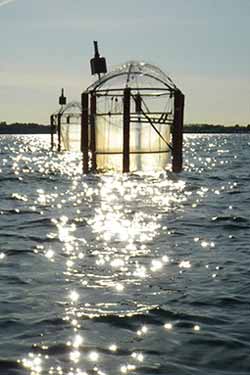Large plastic bags in unique experiment to study ocean acidification

Mesocosms in unique study on ocean acidification in the Gullmar Fjord in Sweden.<br>Photo: Gertje König<br>
The project is unique: mesocosms of this size have never been used for such a long period of time. The experiment is part of a worldwide research project, and includes researchers from the University of Gothenburg, Sweden.
This is the largest and longest experiment on the impact of climate change on marine ecosystems that have been carried out to this date. A team of sixty international researchers are for five months now based at the Sven Lovén Centre for Marine Sciences, University of Gothenburg, Sweden. The research project in the Gullmar Fjord will run from January to June, under the leadership of top German researcher Ulf Riebesell.
The mesocosms has been lowered into the fjord with the help of divers from the research vessel Alkor. Each mesocosm will now enclose 55,000 litres of seawater, containing organisms from the winter waters of the Gullmar Fjord.
Carbon dioxide is added to half of the mesocosms and the researchers are going to observe the effect of different acidity levels on marine plants and animal plankton by monitoring the plankton over many generations and measuring the chemistry of the water every day. They will also going to add herring and cod larvae to see how they develop in the enclosed seawater.
Similar studies have been carried out previously on a smaller scale in Polar environments, off the coast of Hawaii and off the Finnish and Norwegian coasts. However, mesocosms of this size have never been used for such a long period of time.
Watch a film about the mesocosms here:
http://www.geomar.de/en/discover/films/ocean-acidificationan-ecosystem-facing-dissolution/
The BIOACID (Biological Impacts of Ocean ACIDification) project is being coordinated by Ulf Riebesell, Professor of Biological Oceanography at the GEOMAR Helmholtz Centre for Ocean Research in Kiel, Germany. The 60 or so researchers participating in BIOACID in the Gullmar Fjord come from Germany, the UK, the Netherlands, Sweden and Finland.
Contact: Peter Tiselius
Phone: +46 31786 9539
e-mail: peter.tiselius@bioenv.gu.se
Media Contact
More Information:
http://www.gu.seAll latest news from the category: Ecology, The Environment and Conservation
This complex theme deals primarily with interactions between organisms and the environmental factors that impact them, but to a greater extent between individual inanimate environmental factors.
innovations-report offers informative reports and articles on topics such as climate protection, landscape conservation, ecological systems, wildlife and nature parks and ecosystem efficiency and balance.
Newest articles

Microscopic basis of a new form of quantum magnetism
Not all magnets are the same. When we think of magnetism, we often think of magnets that stick to a refrigerator’s door. For these types of magnets, the electronic interactions…

An epigenome editing toolkit to dissect the mechanisms of gene regulation
A study from the Hackett group at EMBL Rome led to the development of a powerful epigenetic editing technology, which unlocks the ability to precisely program chromatin modifications. Understanding how…

NASA selects UF mission to better track the Earth’s water and ice
NASA has selected a team of University of Florida aerospace engineers to pursue a groundbreaking $12 million mission aimed at improving the way we track changes in Earth’s structures, such…





















